Premium Only Content

Was the attack on Pearl Harbor provoked? Ginnette Rankin's speech to the US Congress in 1942
22.01.2024 | www.kla.tv/27971
Honorable audience, On December 7, 1941, the attack on Pearl Harbor by Japan justified America's entry into World War II. We must never forget this day. Why? The instigation of this war demonstrates a pattern of repeated terrorism by the U.S. and British governments based on lies. How Japan was drawn into a bloody war with the U.S. as planned is explained in detail in the following speech by modern-day witness Janet Rankin, as introduced by our North American correspondent in front of the Rankin Hall.
Dan: I'm reporting from the snowy campus of the University of Montana in Missoula, Montana, on the eve of the anniversary of the attack on Pearl Harbor. There is a connection between the current environment and the events at Pearl Harbor 82 years ago. The building behind me is Rankin Hall, named after Janet Rankin, a Montana politician who made history in 1916 as the first female member of the U.S. Congress. She was also the only person in Congress to vote against the United States' participation in both World Wars. In 1916, Mrs. Rankin campaigned for social issues, women's suffrage, and American neutrality in World War I. Immediately after the victory, she was faced with a momentous decision. In April 1917, President Woodrow Wilson, who was also calling for neutrality, gave a speech to Congress with the campaign slogan “He kept us out of war” and asked for approval to enter the war. Wilson had already seriously violated neutrality by supplying weapons and funds to the Allies, who had been fighting Germany since 1914. In his famous war speech to a joint session of Congress, the president praised the American government as “one of the greatest defenders of human rights” and declared that “the world must be made safe for democracy.” Congress supported Wilson's war plan, but six senators, including Janet Rankin, and 50 members of the House of Representatives voted against the resolution. She told her colleagues that she wanted to stand by her country, but that she did not agree with war. Their vote was very unpopular. The Helena Independent newspaper called her “a dagger in the hands of German propagandists, a fool from the Kaiser, a member of the Hun army settled in America, and a whining schoolgirl.” She lost the support of Montana voters and consequently her seat in Congress. Twenty-three years later, Americans were again advocating neutrality and concerned about plunging into another world war. Wendell Willkie, Roosevelt's opponent in the 1940 election, attracted attention and votes by predicting that Roosevelt would lead America into war.
Roosevelt countered with a promise not to send American troops to war, and he won the election and remained president for a third term. That same year, Jeannette Rankin ran for Congress again, and this time her anti-war stance became the main pillar of her program. In 1941, history repeated itself. The day after the attack on Pearl Harbor, Roosevelt gave one of the most famous speeches in American history in a joint session of Congress: the so-called “Day of Infamy” speech. Once again, the American president asked Congress for a vote of war, and once again, Jeannette Rankin voted against it. But this time, she was the only one to do so. Mrs. Rankin knew how unpopular her vote would be, and that her stance would mean the end of her career as a member of Congress. So why did she vote against it? There were some anti-war members of Congress who spoke in favor of neutrality, but after Roosevelt's description of the Japanese attack as “unprovoked and insidious”, they had no choice but to support him. Even Charles Lindbergh, who had strongly supported American neutrality, changed his mind after the attack on Pearl Harbor and strongly supported America's entry into the war. In this way, Rankin stood alone in Congress. Why? In the “Congressional Record” of the 77th Congress in 1942, there is a speech by Mrs. Rankin. A year later, on the first anniversary of the attack on Pearl Harbor, when the United States was fighting on two fronts with the full support of the people, Jeannette Rankin herself appeared before the 77th Congress and gave a speech entitled “Some Questions about Pearl Harbor”: “Questions about Pearl Harbor. Listen to some of the excerpts from the speech, and judge for yourself whether Mrs. Rankin I would like you to judge for yourself whether Mrs. Rankin had legitimate concerns about supporting Roosevelt's war drive:
Mr. Speaker, we have been at war for a year. As a member of the House who voted against the declaration of war on December 8, 1941, I would like to ask some questions about the significance of certain activities that led to this attack: The attack on Pearl Harbor was the greatest blow in American history. It is entirely reasonable to question whether or not responsible American sources foresaw the Japanese attack.
In this context, I would like to quote the following astonishing statement, which is almost like a prophecy, that appeared in the magazine “The Christian Century” on November 19, 1941 - three weeks before the Japanese attack -: “It is a well-known fact that the entire colonial structure of the white empire is in danger of collapse unless it intervenes in Asia. Many British leaders and decision-makers would welcome American involvement in the war against Japan. In his pre-war book, “Propaganda in the Next War”, Sidney Rogerston's thesis was that the surest way to persuade the United States was to involve them in a war with Japan. What exactly is the British author Rogerson saying about the plans of British imperialists? His book was banned from export to the United States by British censorship in 1939. On page 148, Rogerson says the following about the plans of British imperialists: “It will be much more difficult to persuade the United States than it was in 1914. It would be so difficult that the chances of success would be very small. A clear threat to the United States is needed; this threat must be made known to the whole nation through propaganda before the Republic takes up arms in an external conflict again. If Japan is involved, the situation will be considerably eased. Then, without doing anything further, the United States will be involved. In any case, it would be a natural and obvious goal for our propagandists to achieve, just as they succeeded in getting the United States involved in the war against Germany during the First World War.” In other words, three years before the attack on Pearl Harbor, the British imperialists had already come up with a way to get America to help them once again. But what exactly did they mean by getting Japan involved in a war with America? There is no more effective way of driving a nation to war than economic sanctions, especially against a nation that does not have access to vital raw materials. In fact, at the time of Mr. Rogerson's insightful book, the saying “economic sanctions mean war” was already common. - The repercussions of the 1937 threat by the League of Nations to Italy are still talked about today. Congress: Isn't it enough for Britain to induce the United States to sever commercial relations with Japan? Trade relations are heavily dependent on importing raw materials in exchange for silk and manufactured goods in order to continue its economic life. Is there any evidence to show the specific circumstances in which the British government sold its policy of economic sanctions against Japan to the Roosevelt administration? In the July 1942 edition of the Ladies' Home Journal, the President's close friends Forrest Davis and Ernest K. Lindley wrote an article entitled “How the War Began”. In it, they revealed the following important fact “When President Roosevelt and Prime Minister Churchill met in the bay off Newfoundland for the Atlantic Conference, Churchill tried to tackle the problem head-on. He asked the President to join in the ultimatum to Japan. Before that, the British, Australians and Dutch had repeatedly asked their governments to do so. An ultimatum is a demand coupled with a threat, and represents a dilemma: “Do this, do that, or else...”. In this case, as we shall see shortly, the punitive measures that Japan was threatened with were an economic blockade, in other words sanctions, and were recognized as a provocation to war. But what did the ultimatum itself demand? And is there any evidence that President Roosevelt actually accepted such a demand for an ultimatum from Churchill at the Atlantic Conference? There seems to be good evidence that such an ultimatum was issued by President Roosevelt. No one defended the foreign policy of the current administration more than Henry Luce, the editor of Time, Life and Fortune. He admits that President Roosevelt issued such an ultimatum to Japan, and that it led to the attack on Pearl Harbor. Is there any evidence that the Roosevelt administration, which had already frozen Japanese assets on July 25, 1941, rapidly accelerated economic pressure on Japan after the Atlantic Conference? In order to get an accurate statistical answer, I contacted both the State Department and the Department of Commerce and asked for monthly data on US exports to Japan in 1941. To my surprise, I received the same reply from both departments: “By special executive order, statistics on trade with Japan will not be released after April 1941. Since the Japanese certainly knew what goods they were receiving from the United States throughout 1941, it is appropriate to ask, ”Who are these statistics being hidden from?” As a member of Congress, I could have exercised my privilege and requested this data from the executive branch, but since it is supposed to be confidential, I cannot disclose it at this time. However, when I reviewed other materials, I was able to get a pretty good idea of the extent to which the Roosevelt administration imposed economic sanctions on Japan in the months between the Atlantic Conference and the attack on Pearl Harbor. For example, on page 7 of the August 17, 1941 edition of the New York Times, it says, “Vice President Wallace, who is chairman of the Committee on Economic Defense, confirmed reports that the group is already working on a project to apply trade pressure on Japan.” In other words, less than a week after the Atlantic Conference, the machinery for economic sanctions was already in motion. As the New York Times reported on page 36 on October 24th 1941, six weeks later, Japan's economic plight had worsened dramatically. “Japan's raw material shortage is becoming more serious. As reported today in the Handelsblatt, the suspension of trade with major foreign countries has thrown Japanese industrial activity into serious disarray. Shipping and trade between Japan, the United States, the British Empire and the Netherlands Indies are said to have “virtually ceased.” On December 2, 1941 - five days before the attack on Pearl Harbor - we read about it on page 6 of the New York Times: “Yesterday, the National Industrial Conference reported that Japan was cut off from about 75% of its normal imports because of the Allied blockade. In an analysis entitled “The Effect of the Allied Economic Blockade on Japan”, the committee stated the following. This blockade, despite the severe restrictions imposed by the Japanese government to stretch available supplies, has ultimately had disastrous results. A week before the attack on Pearl Harbor, I asked a prominent foreign Orientalist the following question: “Is the situation in the Pacific really that serious? He replied: “Yes, the situation is serious. Japan has only two choices: go to war or become an economic slave.” When President Roosevelt accepted Churchill's proposal, the question remains as to whether he understood that imposing economic sanctions as a means of enforcing an ultimatum on Japan would mean war. As reported in a July 26, 1941 Ministry of Foreign Affairs report on page 72 , he himself made the following statement at the Volunteer Army Committee on July 24, 1941: “If we had stopped the oil, the Japanese army would have gone to the Dutch East Indies a year ago and there would have been a war. It is difficult to understand that he was unaware of this. Immediately after the Atlantic Conference, that is, two weeks later, Roosevelt implemented this self-admitted war sanction. Wasn't it strange that, after the Atlantic Conference, when a clash with Japan was clearly desirable, Roosevelt suddenly changed his policy and cut off not only war materials but also virtually everything that Japanese civilians needed? Roosevelt had refused to enforce the Neutrality Act of 1936 for years, despite petitions from the public. The Neutrality Act was designed to prevent the transport of war materials to Japan, and as a result, it contributed greatly to the supply of raw materials for the military equipment currently being used by our country's armed forces. Harton W. Sumner, a member of the House of Representatives from Texas who was a member of the same party as the President and the Chairman of the House Judiciary Committee, wrote the following in a letter to the Saturday Evening Post This was published in the April 4, 1942 issue of the magazine on page 26. “We are a very stupid people, and that is why we have allowed our politicians to escape murder charges. Blaming the Japanese for the tragedy of Pearl Harbor and this betrayal is like the following metaphor Someone tickles the mule's hindquarters and then blames the mule for betraying its trust in an attempt to explain its unyielding state.” On November 27, 1941, the Navy General Staff sent a message to the Commander-in-Chief of the Pacific Fleet, basically stating that this message should be regarded as a warning of war, with aggressive action by Japan expected within a few days. Further warnings were issued on November 28, November 30, December 1, December 3, December 4, December 6, and December 7. The last warning reached Hawaii after the Japanese attack had begun. In other words, warnings were issued almost every day for two weeks before the attack on Pearl Harbor. It is difficult to understand what more could have been done in terms of warnings. In fact, the frequency, urgency and wording of these warnings suggest that the attack on Pearl Harbor was not a surprise to the President. Did Prime Minister Churchill admit that he had tried to drag the United States into the war? Yes, he did! This admission was extracted from him after we were already in the middle of the war, as reported on page 6 of the New York Times dated February 16, 1942. “I have studied and calculated the power of the United States and their vast resources, and I do not believe that there is another fact in the world that can compare with this when they feel that they are now in the game with us and the British Commonwealth, whether it lasts a long time or not, until death or victory. This is my dream, what I have been aiming for, and what I have been working for. I admit it quite frankly. Did Churchill or Roosevelt ever admit that the Atlantic Conference was a specific reason for dragging the United States into the war against Japan? In a speech he gave to Parliament on January 28, 1942 (as reported in that day's New York Times reported on the speech, it is difficult to understand what else to call the following admission: “It was the policy of the Cabinet to avoid any involvement with Japan at all costs until we were convinced that the United States would be drawn into the war. On the other hand, after the Atlantic Conference where I discussed these issues with President Roosevelt, and with the possibility of the United States entering the Far Eastern War and securing a final victory even if the United States itself was not attacked, it seemed that some of these concerns had been allayed. And those expectations were not betrayed by the events of this time. It seems that President Roosevelt, under pressure from Churchill, not only issued an ultimatum to Japan and imposed sanctions, but also made a comprehensive commitment to get the United States involved in the war even if Japan did not attack. Today, nearly a million American boys are fighting 3,000 to 8,000 miles from home. The American people are prepared to fight for the “Four Freedoms.” But we know that if we want to give freedom to others, we must first preserve it ourselves. By exercising our traditional rights of freedom of expression and freedom of inquiry, we will continue to ask all kinds of questions and seek answers. When will the full story of what happened at the Atlantic Conference be revealed? We asked about it then, and we are asking about it now. If President Roosevelt had stubbornly refused to enforce the Neutrality Act against Japan, despite the clear demand for neutrality by public opinion, why did he suddenly change his mind at the Atlantic Conference? A year ago, one of my colleagues had watched for months how President Roosevelt had skillfully brought us to the brink of war in the Atlantic, only to be stopped time and again by a reluctant Congress at the last moment. He saw how fate suddenly gave the President a grand moral decision on December 7, 1941. He then exclaimed in despair, “How lucky this man is!” But was it luck?
-
 2:55:23
2:55:23
TimcastIRL
3 hours agoTrump Orders Specialized National Guard Units To Combat Crime In Cities, Dems Furious | Timcast IRL
141K87 -
 LIVE
LIVE
SpartakusLIVE
5 hours ago#1 Rocket CHAMPION of Verdansk wields UNSTOPPABLE new META
1,023 watching -
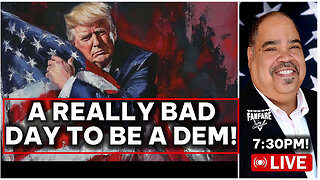 2:55:11
2:55:11
Barry Cunningham
5 hours agoPRESIDENT TRUMP MADE TODAY A VERY BAD DAY TO BE A DEMOCRAT!
50.3K34 -
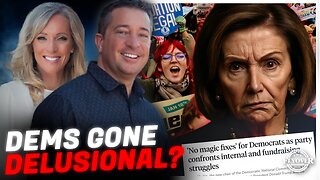 1:15:29
1:15:29
Flyover Conservatives
22 hours agoFrom Cool to Cringe: How Democrats Lost America’s Ear | FOC Show
13.5K3 -
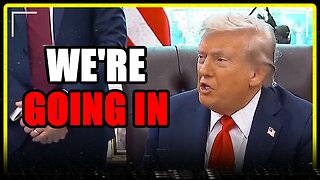 8:19
8:19
MattMorseTV
8 hours ago $2.90 earnedTrump is ACTUALLY DOING IT.
13.6K30 -
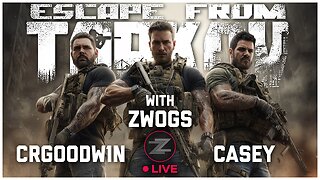 LIVE
LIVE
ZWOGs
11 hours ago🔴LIVE IN 1440p! - Tarkov w/ Casey & crgoodw1n, Kingdom Come Deliverance, & More - Come Hang Out!
163 watching -
 LIVE
LIVE
We Like Shooting
15 hours agoWe Like Shooting 625 (Gun Podcast)
154 watching -
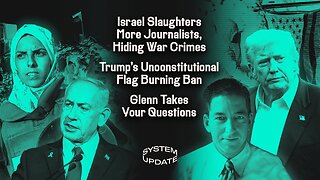 1:45:02
1:45:02
Glenn Greenwald
5 hours agoIsrael Slaughters More Journalists, Hiding War Crimes; Trump's Unconstitutional Flag Burning Ban; Glenn Takes Your Questions | SYSTEM UPDATE #504
100K119 -
 1:29:31
1:29:31
Killerperk
2 hours ago $0.35 earnedRoad to BF6. Come hang out #regiment #bf6
11.2K1 -
 LIVE
LIVE
Jokeuhl Gaming and Chat
3 hours agoDARKTIDE - Warhammer 40k w/ Nubes Bloobs and AoA
31 watching